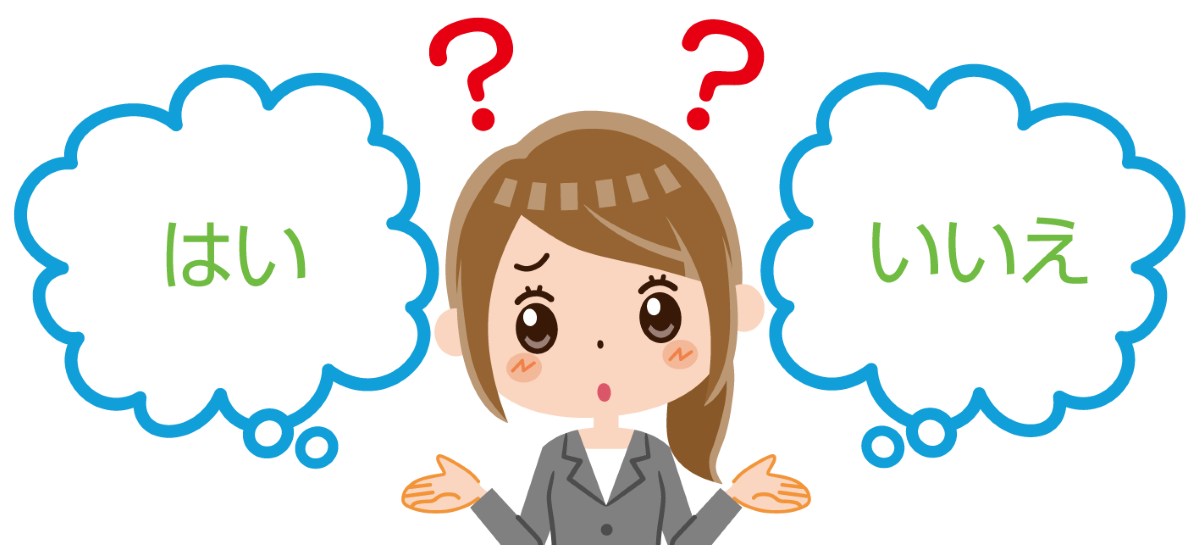When asked “問題はないですか?(Mondai wa naidesuka?) (Don’t you have any problem?)” in Japanese, which of the following do you think is the correct answer?
1.はい、問題はないです。(Hai, mondai wa naidesu) (Yes, I don’t have a problem)
2.いいえ、問題はないです。(Iie, mondai wa naidesu) (No, I don’t have a problem)
The correct answer is “1”, “はい、問題はないです。(Hai, mondai wa naidesu) (Yes, I don’t have a problem).”
“はい” in Japanese means the same as “Yes” in English. “いいえ” has the same meaning as “No” in English. However, when someone asked you a negative question like “問題はないですか?(Mondai wa naidesuka?) (Don’t you have a problem?)” or “寒くないですか? (Samuku naidesuka?) (Aren’t you cold?)” in Japanese, you should answer “いいえ” for Yes and “はい” for No. This is a little confusing for English speakers, isn’t it?
In this post, I will explain why the Japanese way of answering a negative question is the opposite of the English way and the correct way to answer a negative question.
はい or いいえ to a question in Japanese indicates agreement or disagreement with the question
To explain why the way you answer a question in English and Japanese is opposite, let’s consider a question “Are you hungry?” as an example. Your answer is “I am not hungry.”
First, here is how to answer in English.
■In English
Question: Are you hungry?
Answer: No, I am not (hungry)
Question: Aren’t you hungry?
Answer: No, I am not (hungry)
In English, you answer with “Yes” if your answer is affirmative, and “No” if your answer is negative. So regardless of whether the question is in the affirmative or negative, your answer is the same. It’s pretty simple.
Next, let’s look at how to answer in Japanese.
■In Japanese
Question: お腹がすいてますか? (Onaka ga suitemasuka?) (Are you hungry? )
Answer: いいえ、お腹はすいていないです(Iie, onaka wa suiteinaidesu) (No, I am not (hungry))
If the question is an affirmative sentence, Japanese way is the same as English way. You answer “はい” for Yes and “いいえ” for No. Therefore, if you are hungry, the answer would be “はい、お腹が空いています (Hai, onaka ga suiteimasu) (Yes, I am hungry).”
If the question is a negative sentence, the answer is as follows
Question: お腹はすいてないですか?(Onaka ga suitenaidesuka?) (Aren’t you hungry?)
Answer: はい、お腹はすいていないです (Hai, onaka wa suiteinaidesu) (Yes, I am not (hungry))
“はい” and “いいえ” are reversed from “Yes” and “No” in English.
In Japanese, “はい” and “いいえ” to a question do not indicate whether your answer is affirmative or negative, but whether you agree with the question. You say “はい” when you agree with the question and “いいえ” when you do not. When you are asked “Aren’t you hungry?” and you are not hungry, you agree with the question, so you answer “はい.” If you are hungry, you do not agree with the question, so you answer “いいえ.”
Let’s look at another example of a question
Question; もう食べないのですか?(Mou tabenainodesuka?) (Are you not going to eat anymore?)
Answer when you are eating more: いいえ、まだ食べます (Iie, mada tabemasu) (No, I will eat more.)
Answer when you are not eating anymore: はい、もう食べません(お腹いっぱいです)(Hai, mou tabemasen (Onaka ippaidesu)) (Yes, I don’t eat anymore (I am full))
Question: 問題はないですか?(Mondai wa naidesuka?) (Don’t you have any problem?)
Answer when you have a problem: いいえ、問題があります (Iie, mondai ga arimasu) (Yes, I have a problem)
Answer when you have no problem: はい、問題はないです (Hai, mondai wa naidesu) (No, I have no problem)
It is a little complicated, but remember that “はい” and “いいえ” are reversed from “Yes” and “No” in English only in the case of negative questions.
Japanese like negative questions

Japanese often use negative questions.
1.この男を見てませんか? (Kono otoko wo mitesenka?) (Haven’t you seen this man?)
2.(To a staff at a restaurant) 席空いてないですか? (Seki aitenaidesuka?) (Is there no seat available?)
3.ペンを持ってないですか? (Pen wo mottenaidesuka?) (Don’t you have a pen?)
In English, it is common to ask questions like the following, isn’t it? (I know this sentence is negative too)
1.Have you seen this man?
2.Do you have a table?
3.Do you have a pen?
It is not clear why negative questions are so common in Japanese, but it may be because Japanese people want to make things ambiguous or to lessen the shock of a negative answer.
There is an expression used by young Japanese people, “良くなくない? (Yoku naku nai?)” This expression is composed of three adjectives “良く (Yoku)” meaning Good, “なく (naku)” meaning Not, and “ない (nai)” also meaning Not.
I think this is the ultimately expression of Japaneseness.
First of all, it is hard to tell whether it is good or bad. Since “良くない (not good = bad)” is denied, it is asking other people to agree “It is not bad (= good), right?”
Japanese language is very interesting, isn’t it?
OK to answer はい or いいえ incorrectly as long as your answer follows
As mentioned above, negative questions are often asked in Japanese, and you might sometimes answer “はい” and “いいえ” backwards. However, it is OK to mistake “はい” and “いいえ”. However, remember to follow your answer with “はい” or “いいえ.”
Question: 私と映画に行きたくないですか?(Watashi to eiga ni ikitakunaidesuka?) (Don’t you want to go to the movie with me?)
Answer when you want to go: いいえ、行きたいです (Iie, ikitaidesu) (Yes, I want to go)
Answer when you don’t want to go: はい、行きたくないです (Hai, ikitakunaidesu) (No, I don’t want to go)
If you want to go to the movie, it is no problem to answer “はい、行きたいです (Hai, ikitaidesu) (Yes, I want to go).” However, if you end with only “はい,” the person who asked you the question will think that you don’t want to go, so be sure to follow up with “行きたいです (I want to go).”
Question: 冷蔵庫にあった私のプリン食べてないですか? (Reizoko ni atta watashi no purin tabetanaidesuka?) (Didn’t you eat my pudding that was in the refrigerator?)
Answer when you ate it: いいえ、食べました (Iie, tabemashita) (Yes, I ate it)
Answer when you didn’t eat it: はい、食べてないです (Hai, tabetenaidesu) (No, I didn’t eat it)
It is OK to answer “いいえ、食べてないです (Iie, tabetenaidesu) (No, I didn’t eat it)” when you didn’t eat it. If you answer only with “いいえ,” be careful, because you may get very angry. A grudge over food won’t be forgiven easily
So far I have explained the correct way to answer negative question in Japanese, but 分からなかった人はいませんか? (Wakaranakatta hito wa imasenka?) (isn’t there anyone who didn’t understand?)


